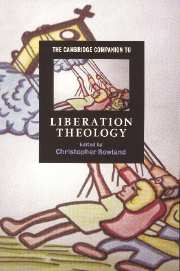Book contents
- Frontmatter
- Introduction
- Part one Contemporary liberation theology
- Part two Aspects of liberation theology
- Part three Analysis and criticism
- 8 Liberation theology and the Roman Catholic Church
- 9 Marxism, liberation theology and the way of negation
- 10 The economics of liberation theology
- 11 Political theology, tradition and modernity
- Epilogue: the future of liberation theology
- Select bibliography
- Index
11 - Political theology, tradition and modernity
from Part three - Analysis and criticism
Published online by Cambridge University Press: 28 May 2006
- Frontmatter
- Introduction
- Part one Contemporary liberation theology
- Part two Aspects of liberation theology
- Part three Analysis and criticism
- 8 Liberation theology and the Roman Catholic Church
- 9 Marxism, liberation theology and the way of negation
- 10 The economics of liberation theology
- 11 Political theology, tradition and modernity
- Epilogue: the future of liberation theology
- Select bibliography
- Index
Summary
Dated from the Medellín Conference, liberation theology is not yet thirty years old. Political theology, by contrast, has many centuries behind it. To define a High Tradition the period 1100-1650 suggests itself: at one end the Gregorian Reforms bring the conflict between papacy and secular rule to the centre of theological discussion; at the other the Moral Science of the early Enlightenment lifts political theory out of the purview of theology. The dates are especially happy as they coincide with two striking contributions to the genre. From the turn of the twelfth century the anonymous York Tractates argue with theological urgency for the sacral character of monarchy, discredited by the new papalism. From the midpoint of the seventeenth century Hobbes's Leviathan, a work with considerably more theology in it than philosophy, seals the case, as early modernity understood it, for politics as an autonomous theoretical discipline. In between lie the great peaks of political theology, scholastic and reformed. But the High Tradition itself did not spring from nothing, but drew on thinkers and ideas of the patristic and Carolingian ages. Augustine is rightly taken as a founding figure; but before him there were Ambrose, Eusebius of Caesarea (notoriously), and from the pre-Constantinian period Lactantius. And why not mention the second-century Letter to Diognetus, which, in turn, was only building on ideas in 1 Peter and Philippians . . . ?
- Type
- Chapter
- Information
- The Cambridge Companion to Liberation Theology , pp. 235 - 247Publisher: Cambridge University PressPrint publication year: 1999
- 2
- Cited by



